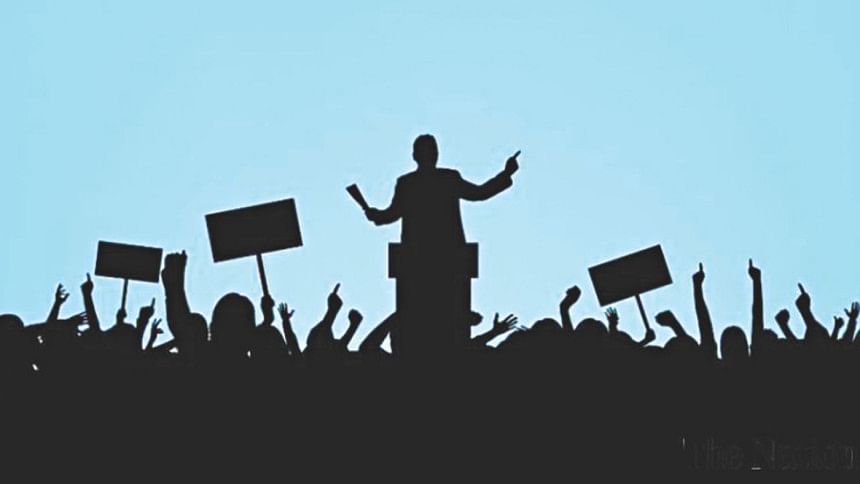How Europe's populists can win by losing

Will the European Parliament elections this May result in a political revolution? Populist and nationalist parties certainly hope so. They are promising not just to overturn the Brussels establishment, but also to end the free movement of people, lift sanctions against Russia, abandon NATO, eschew future trade deals, reverse policies to combat climate change, and abolish gay marriage.
Many of these ideas have long been included in Euroskeptic fringe parties' election programmes. But a major survey of the EU's 27 national political theatres, led by Susi Dennison and Pawel Zerka of the European Council on Foreign Relations (ECFR), that will be published next week, shows that voters could be more responsive to such proposals this year than in the past.
In the past, European elections have been predominantly national, low-turnout, and low-stakes affairs. But those days are over. The campaign season has already become a transnational, pan-European event. While the American populist agitator Steve Bannon is attempting to build a coalition of right-wing nationalist governments, Hungarian Prime Minister Viktor Orbán and Italian Deputy Prime Minister Matteo Salvini have forged a populist alliance that marries the anti-austerity left with the anti-migration right. Orbán and Salvini's goal is to capture EU institutions and reverse European integration from within. They envision nothing less than a re-founding of the West on illiberal values.
Moreover, voter turnout this year will most likely be far higher than the usual 20-40 percent. Just as the Brexiteers managed to mobilise three million Britons who generally abstain from voting, continental populists could attract Europeans who feel as though mainstream parties have forgotten about them. If these voters turn out while supporters of moderate leaders like German Chancellor Angela Merkel and French President Emmanuel Macron stay home, populist parties could significantly outperform current polls.
Moreover, the ECFR study finds that even with a parliamentary minority, a Euroskeptic party grouping could severely curtail the EU's ability to address voters' concerns, as well as threats to its fundamental governing principles. For example, with just one-third of parliamentary seats, populists could block sanctions against member states that violate EU rules and the rule of law. The EU is currently pursuing such measures against both the Law and Justice (PiS) party's government in Poland and Orbán's government in Hungary.
Populist insurgents could also derail EU budget negotiations, and even precipitate an EU "government shutdown", by preventing the 2021-2027 Multiannual Financial Framework if they garner an absolute majority. With a blocking minority or control of certain parliamentary committees, Euroskeptics might also be able to stand in the way of international trade deals and appointments to the European Commission.
Populists who win parliamentary seats will also be eager to weaken EU foreign policy, either through the power of the purse or amendments to policy resolutions. Given that many European populist parties have financial ties to the Kremlin, the goal will be to water down sanctions against Russia. Beyond that, populists also seek to frustrate environmental-policy efforts such as the Paris climate agreement.
The risk, then, is not so much that populists will capture a parliamentary majority and overturn everything on day one, but that they have some representation in the European Commission and secure a large enough minority to bring EU policymaking to a crawl. That, in turn, will prevent the enforcement of EU rules, strengthen nationalist governments, and further undermine European voters' confidence in EU governing institutions. The illiberal governments in Budapest, Warsaw, and Rome would be free to violate EU rules with impunity.
Moreover, the European Parliament elections coincide with a widespread political realignment within EU member states. Thus, for populists and moderates alike, electoral success in May could translate into success at the national level. Estonia and Slovakia will hold general elections before the European Parliament elections, and Belgium and Denmark will hold elections later in the year. In each case, populist parties could ascend to power as coalition partners.
Making matters worse, pro-European parties appear to be falling into the trap laid by these anti-European parties. Across Europe, liberals, Greens, and many left-wing parties are approaching the election as a fight between cosmopolitans and communitarians—between globalism and patriotism. This political framing is more likely to help the insurgent Euroskeptics than anyone else.
Nothing is lost yet. But to avoid a rout, pro-Europeans must stop behaving in ways that confirm the populists' stereotypes of them as supporters of the status quo in Brussels. That means offering an up-front, honest critique of the EU's shortcomings while avoiding the wrong kind of polarisation, particularly on issues where they do not have the support of a clear majority.
At the same time, pro-Europeans need to start deploying "wedge" issues of their own. For example, on the crucial question of migration, it is clear that Orbán and Salvini's interests are not even particularly aligned. While Orbán wants to keep all migrants out, Salvini has called for asylum seekers arriving in Italy to be distributed throughout the EU. Pro-Europeans should be pointing out these contradictions to voters in Hungary and Italy.
Putting aside his other current difficulties, Macron at least is aware of the populist trap. In his speech last November commemorating Armistice Day, he described patriotism as the opposite of nationalism, thus repudiating the narrative that true patriots oppose "globalists". But he has done little to show how his politics can make "left-behind voters" feel safe from globalisation and European integration.
In theory, at least, Macronism still represents the best pro-European alternative to atavistic nationalism. But to avert a populist revolution this May, Macron and other leaders will have to reach beyond their own close circle of cosmopolitan elites. Otherwise, they will have fallen into the Euroskeptics' trap.
Mark Leonard is Director of the European Council on Foreign Relations.
Copyright: Project Syndicate, 2019.
www.project-syndicate.org
(Exclusive to The Daily Star)





Comments